Oxygen nucleophiles - Study guides, Class notes & Summaries
Looking for the best study guides, study notes and summaries about Oxygen nucleophiles? On this page you'll find 41 study documents about Oxygen nucleophiles.
All 41 results
Sort by
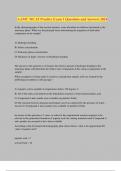 Popular
Popular
-
AAMC MCAT Practice Exam 1 Questions and Answers 2024
- Exam (elaborations) • 76 pages • 2024
- Available in package deal
-
- $14.49
- 1x sold
- + learn more
AAMC MCAT Practice Exam 1 Questions and Answers 2024 In the chromatography of the reaction mixture, water absorbed on cellulose functioned as the stationary phase. What was the principal factor determining the migration of individual components in the sample? A) Hydrogen bonding B) Solute concentration C) Stationary phase concentration D) Thickness of paper -Answer-A) Hydrogen bonding The answer to this question is A because the relative amount of hydrogen bonding to the stationary phas...
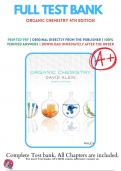
-
Test Bank for Organic Chemistry, 4th Edition by David R. Klein | 9781119659594|Chapter 1-27 | All Chapters with Answers and Rationals
- Exam (elaborations) • 2151 pages • 2023
- Available in package deal
-
- $24.14
- 28x sold
- + learn more
Test Bank for Organic Chemistry 4e 4th Edition by David R. Klein. ISBN-13: 9594 Full chapters test bank PDF TABLE OF CONTENTS 1 A Review of General Chemistry: Electrons, Bonds, and Molecular Properties 1 1.1 Introduction to Organic Chemistry 2 1.2 The Structural Theory of Matter 3 1.3 Electrons, Bonds, and Lewis Structures 4 1.4 Identifying Formal Charges 7 1.5 Induction and Polar Covalent Bonds 8 1.6 Reading Bond-Line Structures 11 1.7 Atomic Orbitals 14 1.8 Valence Bond Theory 17 1.9 Molecular...
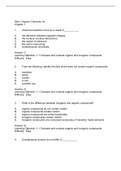
-
Test Bank for Organic Chemistry, 4th Edition by David R. Klein
- Exam (elaborations) • 2149 pages • 2022
-
- $29.99
- 82x sold
- + learn more
Test Bank for Organic Chemistry 4e 4th Edition by David R. Klein. ISBN-13: 9594 Full chapters test bank PDF TABLE OF CONTENTS 1 A Review of General Chemistry: Electrons, Bonds, and Molecular Properties 1 1.1 Introduction to Organic Chemistry 2 1.2 The Structural Theory of Matter 3 1.3 Electrons, Bonds, and Lewis Structures 4 1.4 Identifying Formal Charges 7 1.5 Induction and Polar Covalent Bonds 8 1.6 Reading Bond-Line Structures 11 1.7 Atomic Orbitals 14 1.8 Vale...
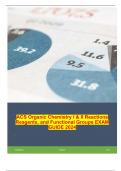
-
ACS Organic Chemistry I & II Reactions Reagents, and Functional Groups EXAM GUIDE 2024
- Exam (elaborations) • 11 pages • 2024
- Available in package deal
-
- $14.99
- + learn more
Alcohol - Ketone - Amine - Ether - Amide - Ester - functional groups - Alkyl - An alkane missing a hydrogen Aromatic compound - Cyclic, planar, with every atom of the aromatic ring having a p orbital, while obeying hackles rule of 4n+2 pi electrons Vinyl - Hydrolysis Reaction - Carboxylic Acid - pKa ~ 5 Enantiomers - stereoisomers that are non super imposable mirror images Diastereomers - - Same molecular formula, same bond connections, NOT mirrors...
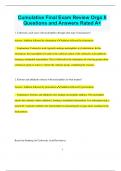
-
Cumulative Final Exam Review Orgo II Questions and Answers Rated A+
- Exam (elaborations) • 22 pages • 2024
-
- $9.99
- + learn more
Cumulative Final Exam Review Orgo II Questions and Answers Rated A+ 1. Carboxylic acids react with nucleophiles through what type of mechanism? Answer: Addition followed by elimination Addition followed by elimination Explanation: Carboxylic acids typically undergo nucleophilic acyl substitution. In this mechanism, the nucleophile first adds to the carbonyl carbon of the carboxylic acid (addition), forming a tetrahedral intermediate. This is followed by the elimination of a leaving group...

-
Organic Chemistry ACS Final Exam Study Questions and Answers with Complete Solution 2024
- Exam (elaborations) • 6 pages • 2024
- Available in package deal
-
- $13.49
- + learn more
Basicity rules - -strong base: unstable/reactive (ED groups) -weak base: stable (EW groups/more EN/bigger) Chair conformation - -more stable equitorial (slanted) -pointing up/pointing down=cis if both up -elimination: trans and diaxial Newman projection - -gauche: substituent groups adjacent to eachother -grab middle and turn to put in plane Enantiomers - -not superimposable mirror images -same besides stereochemistry Diastereomers - -mirror images but one stereocenter stays and...
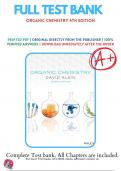
-
Test Bank for Organic Chemistry, 4th Edition by David R. Klein 9781119659594 | All Chapters with Answers and Rationals
- Exam (elaborations) • 2151 pages • 2023
- Available in package deal
-
- $22.81
- + learn more
Test Bank for Organic Chemistry 4e 4th Edition by David R. Klein. ISBN-13: 9594 Full chapters test bank PDF TABLE OF CONTENTS 1 A Review of General Chemistry: Electrons, Bonds, and Molecular Properties 1 1.1 Introduction to Organic Chemistry 2 1.2 The Structural Theory of Matter 3 1.3 Electrons, Bonds, and Lewis Structures 4 1.4 Identifying Formal Charges 7 1.5 Induction and Polar Covalent Bonds 8 1.6 Reading Bond-Line Structures 11 1.7 Atomic Orbitals 14 1.8 Valence Bond Theory 17 1.9 Molecular...
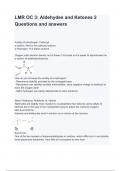
-
LMR OC 3: Aldehydes and Ketones 2 Questions and answers
- Exam (elaborations) • 3 pages • 2024
- Available in package deal
-
- $7.99
- + learn more
Acidity of α-Hydrogen: Carbonyl α-carbon: Next to the carbonyl carbon. α-Hydrogen: H of alpha carbons Oxygen pulls electron density out of these C-H bonds so it's easier to deprotonate the α-carbon of aldehydes/ketones. How do you increase the acidity of α-Hydrogen? - Resonance stability provided by the conjugate base - Resonance can stabilize enolate intermediate, since negative charge is distributd to more EN oxygen atom - Alpha hydrogen can easily deprotonate in basic solutions...
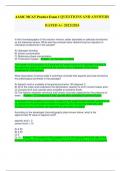
-
AAMC MCAT Practice Exam 1 QUESTIONS AND ANSWERS RATED A+ 2023|2024
- Exam (elaborations) • 61 pages • 2023
-
- $13.49
- + learn more
AAMC MCAT Practice Exam 1 QUESTIONS AND ANSWERS RATED A+ 2023|2024 In the chromatography of the reaction mixture, water absorbed on cellulose functioned as the stationary phase. What was the principal factor determining the migration of individual components in the sample? A) Hydrogen bonding B) Solute concentration C) Stationary phase concentration D) Thickness of paper - Answer - A) Hydrogen bonding The answer to this question is A because the relative amount of hydrogen bonding to t...
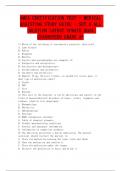
-
MCAT AAMC Question Packs Mixed ALL SOLUTION LATEST EDITION 2024 GUARANTEED GRADE A+
- Exam (elaborations) • 32 pages • 2024
-
- $9.99
- + learn more
temperature is related to KE how? temp is the average kinetic energy thermal energy is related to KE how? thermal energy is the total KE Brainpower enthalpy of fusion is ALWAYS greater than enthalpy of vaporization because? it has to break more bonds (solid --> liquid) the amount of heat depends on (2 factors) 1. the type of substance 2. the amount of the substance during a phase change does temperature change? NO if an archaebacerial species lives in a pool that is 0.01 M HCL wh...

How did he do that? By selling his study resources on Stuvia. Try it yourself! Discover all about earning on Stuvia


